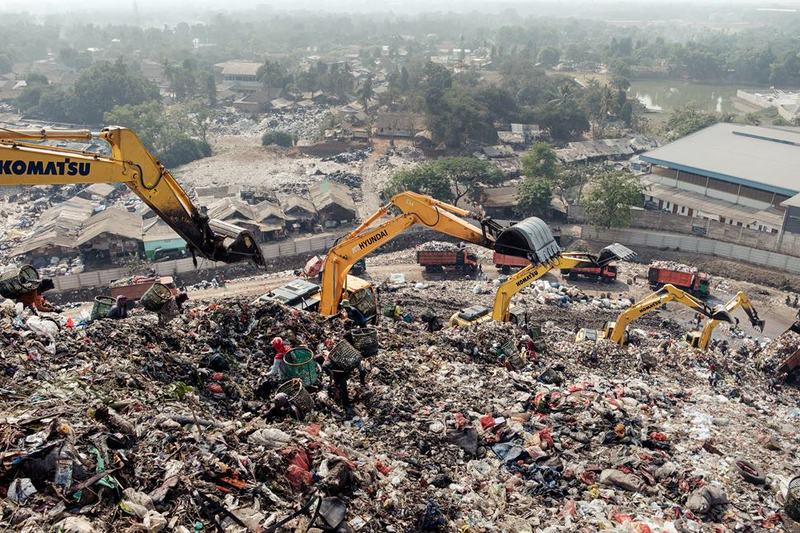
Jakarta. A buzzing city with its frenzied morning rush hours and bustling nightlife. A place where everything is going and growing rapidly including municipal and household consumption level.
It is widely known that Indonesia is facing a colossal plastic waste problem and Jakarta is one of the biggest contributors for plastic waste, including the notorious single use plastic bag. Based on data from the Jakarta Environmental Agency, the city produces around 7,200 tonnes of waste daily, with 1 per cent of the waste made up of single-use plastic bags (72 tonnes per day).
Polyethylene plastic is a relatively new creation. It was created by Celloplast, a Swedish company in 1965, designed by engineer Sten Gustaf Thulin, originally to save the environment by replacing paper bags with a more durable and reusable option. It gained massive popularity worldwide in the 80s. By 2016, Indonesia is churning out a staggering 9.8 billion single-use plastic bags per year, most of which ended up not being recycled or even collected properly. We have the infamous Bantar Gebang landfill, which made its way to international attention with its seemingly never-ending parade of waste-carrying trucks and windborne single-use plastic bags. Almost all of them are dumped from Jakarta City.
After being warned of an impending environmental disaster, Jakarta is now trying to move forward to a better future. DKI Jakarta is starting to enforce the paid single-use plastic bags policy, the National Government is aiming to reduce marine debris by 70 per cent in 2025, and its citizens are beginning to be concerned about mindful consumption lifestyle.
The rise of zero waste bulk grocery stores, zero waste lifestyle kit, disposable bioplastics from seaweed and cassava, indicate that Indonesia, though mostly in its big cities, is now aware about sustainability issues. People are starting to carry around personal reusable tumblers for coffee and of course bringing durable shopping bags.
I Want to Smell The Perfume is a Jakarta-based social enterprise, which combines positive social impact and environmental impact by actively partaking in women empowerment and reducing single-use plastic bag waste and marine debris, especially derelict fishing nets.
The concept is to provide handcraft skill training and job opportunities for women who are living in straitened circumstances, for them to be able to earn income without leaving their household priorities.
Their products are aimed at replacing single-use plastic bags, with attractive designs and practical features. The main series is hand-crocheted baskets tailored for grocery shopping. Some are created for regular groceries and the rest are for fresh department shopping as they are ingeniously equipped with a ribbon tape to stick the barcode paper from the weighing scale.
Another notable product is beautiful bags made by upcycling discharged fishing nets and hand-crocheted handle. Ghost fishing nets are one of the most threatening debris for marine ecosystem, as it causes fatal entanglement and sunlight blockage for marine animals and the coral reefs. According to a report jointly produced by FAO (Food and Agriculture Organization) and UNEP (United Nations Environment Programme), experts have estimated that there are roughly 640,000 tonnes of this nets currently being lost in our oceans. As they are mostly made from nylon and polyester (plastic), it will take almost forever for them to decompose.
I Want to Smell The Perfume also keeps launching new designs to cater to other requirements of reusable bags. In Jakarta, I Want to Smell The Perfume’s products can be purchased at several points of sales: Komunal 88 in Ampera Raya, The Good Things in Life in Terogong, Unearth in Gandaria, Morrissey Hotel in Menteng and People’s Project in Kuningan City.
Komunal 88 was the first to support I Want to Smell The Perfume. It is a Signing Blue-certified Café & Kitchen, offering gourmet goods and comfort food prepared with sustainably sourced fresh ingredients. Located in Jalan Ampera Raya, South Jakarta, they are committed to reducing carbon footprint and eliminating single-use disposable anything in their restaurant. They built a reverse-osmosis water treatment system for the whole building. This enables them to avoid commercial water, as both still and sparkling water is produced on location, using sterilised reusable glass bottles. “We started Komunal 88 with sustainability and responsibility in mind,” says JC. “We saw food as a way to share and communicate emotions, values and beliefs to engage our customers. Our challenge is not so much to inform than it is to engage, and to advocate for less throwing-away and more slowing-down.”
It's getting easier to opt for a more sustainable lifestyle in Jakarta. If people could use 2 to 5 plastic bags daily, by using reusable ones, one person will avoid approximately 720 to 1,800 plastic bags annually. I Want to Smell The Perfume provides a wide variety of locally made reusable bags, while reducing ghost fishing nets number and actively engaging in women empowerment.









